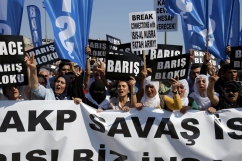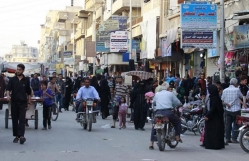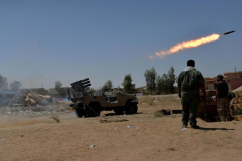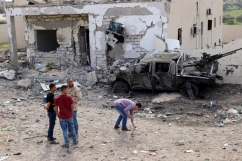U.S. President Barack Obama's coalition against the Islamic State (ISIS) is reportedly disintegrating with only less than a dozen of the 65 member-countries now actively contributing to support the air campaign against ISIS targets in Syria and Iraq.
A report by the Washington Times said many Arab members including Saudi Arabia, Jordan and the United Arab Emirates (UAE) have not flown missions in the last 10 months or contributed anything to support the sorties.
"The Saudis haven't flown a bombing mission in nearly three months, Jordan stopped flying sorties in August, and the United Arab Emirates hasn't flown one since March," the Times reported Tuesday, citing information from an unnamed Pentagon official.
The report said that a former Obama administration official who helped build the coalition last year divulged that Persian Gulf Arab powers made a strategic gamble months ago to focus their military resources on helping Saudi Arabia wage war against Houthi rebels, which are seen as Iranian proxies, in neighbouring Yemen.
"They're eye-deep in Yemen now, and their attention is completely skewed in that direction," he said. "It's sucked up all the sorties and ground forces that we had wanted to deploy in Iraq and maybe in Syria."
But the official said it would also be wrong to say the Saudis and others had completely abandoned the efforts on ISIS. "Their calculation was that the Americans would take care of leading the coalition against Daesh (ISIS) while they take care of fighting the Iranians in Yemen.''
According to J. Matthew McInnis, Mideast-focused fellow with the American Enterprise Institute in Washington, the Saudis' involvement with the threat posed by Iran is understandable. "They still recognise ISIS as a problem... But since the Iran nuclear deal, they're really more focused on the Iran threat and, first and foremost for them, that's in Yemen, where they saw Iran trying to get a foothold."
Months before the nuclear deal between Tehran and the United States was signed, Yemen had reportedly emerged as ground zero for a proxy war pitting Saudi Arabia, the Middle East's top Sunni Muslim power, and Iran, the region's largest Shiite power.
In early September, Arab air and ground offensive has been carried out against the Iran-backed Houthi forces in Yemen, wherein 45 UAE soldiers and five troops from Bahrain were killed in Yemen, said the Times.
Critics meanwhile blasted the Obama government for not doing a good job in leading U.S. allies in the coalition, including Turkey, Germany, Britain, Australia and France.
Obama administration officials dismissed the criticism, saying that several Arab powers remain "very much a part of the effort.''
"Even if the airstrikes are not there because of the focus on Yemen, they're still allowing the use of their bases, and they're still very much involved with the humanitarian effort and the finance effort," the unnamed official told the Times.

















